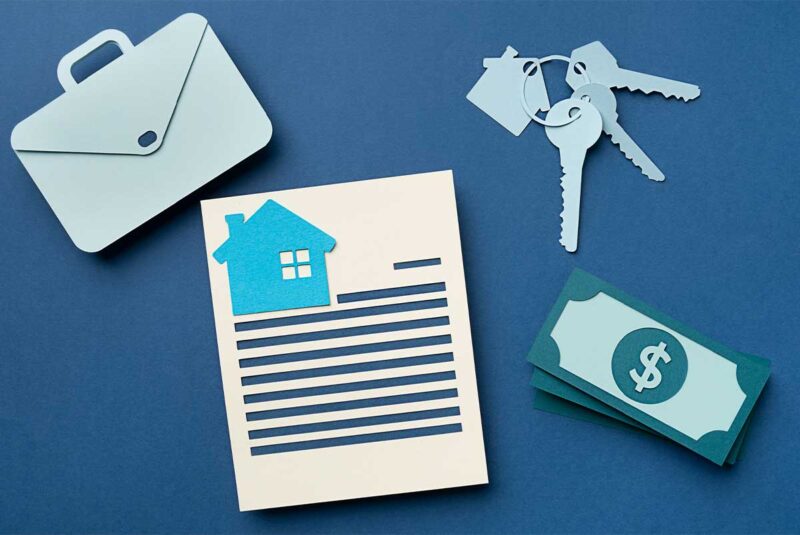Ready To Buy a Home?
Get Approved to Buy a Home
Rocket Mortgage® lets you get to house hunting sooner.
Buying a home is more than a major life milestone. It’s a major financial investment. And with so much at stake, it’s important to work with real estate professionals, including mortgage lenders, that can offer accurate information and help you make smart decisions.
Our guide will help you recognize the different types of mortgage lenders and understand how each one can help secure financing for a home.
What’s a Mortgage Lender?
Explore Your Mortgage Options
What are you looking to do?
Unless you have stacks of cash at the ready, you’ll need a mortgage loan to buy a home. A mortgage lender (also known as a mortgage banker), like a credit union, bank or online lender, gives you a loan to purchase or refinance real estate or tap into its equity. Many mortgage lenders also service their loans, which involves processing payments, tracking balances and handling associated day-to-day activities.
Depending on how they conduct business, mortgage lenders work under different names. There are three types of mortgage lenders: retail lenders, direct lenders and online lenders. You may also hear of hard money lenders, wholesale lenders or portfolio lenders (we’ll revisit these lenders later in the article).
What’s a Mortgage Broker?
Let’s get this out of the way first: A mortgage broker is not a lender. A mortgage broker matches borrowers with lenders, ensuring that each borrower gets the best loan for their financial situation.
When you work with a mortgage broker, the broker collects the financial information you would typically submit to a mortgage lender – your pay stubs, tax returns, bank statements, etc. – and uses it to match you with a mortgage lender. A broker will also pull your credit report and check your credit score.
Mortgage Lenders vs. Mortgage Brokers
Though they both help people borrow money for a mortgage and working with either has its advantages and disadvantages.
Pros and cons of working with a mortgage lender
One of the benefits of working with a mortgage lender is that you work with the same company from application to closing. This creates a sense of stability as you make your way through the home buying process.
A potential drawback of working with a mortgage lender is that you’ll only have access to the loans and terms offered by that specific lender.
Pros and cons of working with a mortgage broker
A mortgage broker works with multiple lenders, which will increase the pool of lenders and loans you have access to and may increase your chances of finding a loan with lower interest rates and better terms.
Another advantage of working with a mortgage broker is that you may gain access to unique lending programs. For example, a broker may be able to help you find a mortgage lender who specializes in loans for borrowers with bad credit or no credit.
A potential drawback of working with a mortgage broker is that some mortgage lenders won’t work with brokers, preventing you from accessing home loan products from certain financial institutions.
In some cases, you’ll need to pay a broker’s fee. Brokers typically don’t charge anything upfront for their services, but some brokers do. Sometimes the fee is added to your mortgage at closing, increasing your total cost of borrowing.
12.8 million
Number of mortgages originated in the U.S. in 2020.[1]
What Are the Different Types of Mortgage Lenders?
There are several types of mortgage lenders. Here are the most common ones:
Retail lenders
Retail lenders loan money directly to consumers, eliminating the need for an intermediary. Banks, credit unions and online lenders are examples of retail lenders. What sets retail lenders apart from direct lenders is that retail lenders offer a range of other credit products.
For example, a bank may also offer personal loans, credit cards and home equity lines of credit.
One of the main advantages of working with a retail lender is that you can keep all your accounts in one place. If you already have an account(s) at a bank, for example, and you like their loan products, you may want to get your mortgage from your bank.
What is a credit union?
Credit unions offer many of the same services banks offer, but they’re cooperative nonprofit organizations owned by their members. Credit unions are also known for their competitive interest rates and high-quality customer service.
A credit union may also offer unique loan programs that aren’t available through other mortgage lenders. You may qualify for more favorable loan terms. And if you have a low credit score, it won’t necessarily disqualify you for a loan.
The main drawback of using a credit union is that you have to be a member before you can take advantage of any loan products. Many credit unions have employment or residency requirements, making it difficult for some people to qualify for membership.
Direct mortgage lenders
A direct mortgage lender is a financial institution that specializes in mortgages and uses its own funds to help borrowers purchase homes. A mortgage bank is a common example of a direct lender.
Because a direct lender doesn’t offer other types of credit products, they may be a little more flexible when it comes to qualifying for a home loan. However, you may only have access to a limited number of mortgage products.
Online mortgage lenders
Online mortgage lenders allow you to apply for a mortgage loan and close on a mortgage loan without setting foot in a lender’s or broker’s office. If you work with an online lender, you’ll fill out an online application, upload your verification documents and go through a digital closing process.
A key advantage of working with an online lender is the all-digital experience. You won’t have to drive back and forth to sign loan documents or drop off paperwork. You can also apply for a loan at any time of the day or night, making the application process more convenient.
One of the potential drawbacks of working with an online lender is that you likely won’t develop a relationship with a loan officer. And depending on the lender, you may have to meet stricter loan requirements.
Portfolio lenders
Like several types of lenders, portfolio lenders use their own money to originate loans, but they typically keep the loans in-house on their portfolio(s) rather than sell them to other financial institutions.
Portfolio lenders typically establish their own lending guidelines. If you need to borrow a large amount of money or have a credit profile that makes you look like too much of a risk for other lenders, a portfolio lender may be able to approve you. But, because of this increased risk, you may have to accept a home loan with a higher interest rate.
Hard money lenders
A hard money lender is an individual or private company that uses its own money to fund mortgage loans. This type of lender is typically used to buy properties that can be fixed and flipped in a short amount of time.
The main advantage of working with a hard money lender is that you may qualify for a loan even if you’ve been turned down by direct lenders, retail lenders and portfolio lenders.
But working with hard money lenders has several potential drawbacks. For example, hard money lenders typically expect to be paid back in a few years, not the 10 – 30 years typically allowed by other lenders. A hard money lender may also have higher mortgage rates and require a higher down payment than other lenders.
Wholesale lenders
Wholesale lenders don’t offer loans directly to consumers. Instead, they lend through third parties, such as retail lenders or mortgage brokers. Even though they don’t work with borrowers, they do set the terms for each mortgage loan.
How To Compare Lenders and Their Products
Before choosing a lender, it’s important to compare your options. Look at multiple lenders and go with the one with the terms you have the best chance of qualifying for. Here are some factors to consider when making your decision:
- Interest rate (mortgage rate): Your interest rate affects your monthly payment and the total cost of the loan.
- Closing costs: When the loan closes, you pay closing costs, which include origination fees, appraisal fees and inspection fees. Some lenders charge higher fees than others, making closing costs an important factor to consider.
- Flexibility: Some lenders work with borrowers who have credit or savings issues. If, for example, you’re self-employed or coming out of bankruptcy, look for lenders who offer flexible mortgage terms.
When you talk to a lender, be sure to ask about their lending guidelines, including their minimum qualifying credit score and maximum debt-to-income (DTI) ratio. Knowing this information in advance can help you avoid wasted time and effort with a mortgage lender who isn’t likely to approve you.
Ask what fees you can expect to pay and when those fees are due. In most cases, fees are paid once the loan closes – but you should verify so there aren’t any surprise expenses in the middle of the home buying process.
Choose Your Lender
While you’re looking for the best mortgage lender or broker for you, continue (or start) making financially savvy decisions. Avoid making large purchases on your credit cards, make your credit card payments on time and do what you can to keep your income steady and increase or maintain your credit score.
Smart money moves can help increase your chances of getting a mortgage loan approved and may make the process of getting a mortgage less stressful.
Get approved to buy a home.
Rocket Mortgage® lets you get to house hunting sooner.
The Short Version
- A mortgage lender (also known as a mortgage banker), like a credit union, bank or online lender, gives you a loan to purchase or refinance real estate or tap into its equity
- There are three types of mortgage lenders: retail lenders, direct lenders and online lenders
- A mortgage broker matches borrowers with lenders, ensuring that each borrower gets the best loan for their financial situation
Federal Housing Finance Agency. “National Mortgage Database Aggregate Data.” Retrieved May 2022 from https://www.fhfa.gov/DataTools/Downloads/Pages/National-Mortgage-Database-Aggregate-Data.aspx
Ibis World. “Online Mortgage Brokers in the US – Market Size 2003–2027.” Retrieved May 2022 from https://www.ibisworld.com/industry-statistics/market-size/online-mortgage-brokers-united-states/




